Chris Christie on Donald Trump appearance: ‘I wasn’t being held hostage’

Anyone worried that Republican Gov. Chris Christie was being held hostage by Donald Trump as he stood, seemingly shell-shocked, behind the GOP presidential front-runner on Super Tuesday can rest easy. “No, I wasn’t being held hostage. No, I wasn’t sitting up there thinking, ‘Oh, my God, what have I done?’” Christie said Thursday back home in New Jersey. “I don’t know what I was supposed to be doing. All these armchair psychiatrists should give it a break.” He said his face was stoic because he was listening as Trump spoke. In “I stood where they asked me to stand. What do I care? Do you think I really care? … I really don’t,” he said. “Next week there will be an Internet freakout about something else.” InChristie also said he won’t heed calls from a handful of newspapers to resign and will continue helping Trump’s campaign. His defense of endorsing the billionaire developer came as two former Republican presidential nominees — including Mitt Romney on Thursday — and 70 national security experts warned that Trump was unfit to be commander in chief. Christie said he doesn’t agree with Trump on everything, though he wasn’t specific. He said he’s told Trump when he disagreed with him and has tried to change his mind. “That’s what a good endorser does,” Christie said. He spoke Thursday at a nearly two-hour news conference in Trenton that was part campaign debriefing, part attempt to refocus on priorities in the state. But he opened the floor up to questions, and reporters had a lot of them. Christie, who ended his own Republican presidential campaign last month, said he will continue helping Trump’s campaign but doesn’t have any more appearances scheduled. Christie added that his 30th wedding anniversary is next week, but he is otherwise focused on state priorities, including a budget due in June. Seven New Jersey newspapers have called on Christie to resign. The Star-Ledger, which endorsed Christie in his 2013 re-election campaign, said in an editorial Thursday that he has since made it clear that governing the state is a “distant second priority” that comes behind his personal ambition. Six newspapers published by Gannett also called for his resignation. Christie said he isn’t surprised by the newspapers’ stance because they haven’t supported him in the past. He said they’re merely trying to find a way to stay relevant as their readerships decline. “The only way to do that is to set themselves on fire,” Christie said. Christie, who spent 261 days out of the state in 2015, also chided the media for counting time he spent either in Philadelphia or New York as somehow not related to state business. “The way you count days is absurd,” he said. He said the Trump campaign financed his recent trips, but state taxpayers, as they always do, will be on the hook for the New Jersey State Police detail that is required to travel with him. Defending his endorsement, Christie said he believes Trump would make the best president out of the remaining candidates and has the best chance to defeat Democrat Hillary Clinton in the general election. He said he and Trump have been friends for 14 years. Christie noted that despite jokes from online commenters, he wasn’t forced into giving any coerced statements on Trump’s behalf. “This is part of the hysteria of the people who opposed my Trump endorsement,” Christie said. Christie said he plans to finish out the nearly two years left in his term and then go into the private sector. He did shoot down one question Thursday. When a reporter asked if he would resign if he were Trump’s pick for vice president, he replied, “Next!” Republished with permission of the Associated Press.
Hillary Clinton now faces struggle to win back younger voters

Standing in a line of thousands outside an arena at Colorado State University, Aleksandr Cronk contemplated the grim possibility that the man he was waiting to see, Bernie Sanders, may not make it to the November ballot and he’d have to decide whether to vote for Hillary Clinton. Like millions of young voters nationwide, Cronk has been electrified by Sanders’ longshot bid for the Democratic presidential nomination. Even as Clinton has racked up a commanding lead in the contest, she’s overwhelmingly losing voters between ages 18 and 29 in early-voting states. Her lukewarm reception among people like Cronk points to a challenge for her in November, should she win the nomination. Overwhelming support from young voters twice helped secure the White House for Barack Obama. “I don’t think there’s going to be a lot of change” if Clinton wins, said Cronk, 21. Like many younger voters, he’s especially alarmed by income inequality, the issue that Sanders has made a centerpiece of his campaign. “The Clintons don’t really stand in that position very well. Clinton’s weakness with younger voters has stood out consistently this year — she lost Democratic primary voters who are aged 18 to 29 by 70 points in Iowa, 68 points in New Hampshire and 25 points on Super Tuesday, when she won seven of the 11 states in play for Democrats. “Hillary’s weakness with millennials has to be very worrisome for the Democratic Party,” said Simon Rosenberg, president of the New Democrat Network, a center-left advocacy group. “What you’re seeing is the millennial generation has essentially seceded from the Democratic establishment.” Obama’s presidential campaigns showed the power of voters under 30, who gave him 2-1 support in both 2008 and 2012. In 2016, even more millennials than Baby Boomers are eligible to vote, and they make up a large share of potential voters in battleground states such as Ohio, Pennsylvania and Iowa, demographers say. For months, Clinton tried to connect with younger voters through famous supporters such as singer Katy Perry and actor Lena Dunham. She embraced the anti-police-brutality movement Black Lives Matter, spearheaded by young African-Americans, and vowed to expand President Obama’s deportation relief for young people in the country illegally and their families. She promised debt-free college for all, only to be one-upped by Sanders’ pledge of free college for all. Clinton has acknowledged she’s fallen short, saying she has to work harder to convince young people she will help them. When an Iowa college student asked her in January why so many other youths found her dishonest, Clinton blamed decades of Republican attacks. “I have been around a long time and people have thrown all kinds of things at me and I can’t keep up with it,” replied Clinton. “If you are new to politics and it’s the first time you’ve really paid attention, you go, ‘Oh my gosh, look at all of this.’” Joelle Gamble of the Roosevelt Institute, a liberal New York think-tank, said young voters are increasingly distrustful of institutions like political parties. She noted that, on the Republican side, many have rallied around Texas Sen. Ted Cruz, who boasts of how hated he is by Washington Republicans. “I don’t think there’s any one candidate that can fix this,” she said. Sanders, a socialist senator who was an independent until launching his quixotic Democratic primary run last year, has come the closest. His call for a political revolution has reached people like Daniel Harty, a 21-year-old computer science student in Las Vegas who once saw himself as a libertarian but registered as a Democrat to support Sanders. Should Clinton be the nominee, Harty said, he’d never back her. “Hillary Clinton doesn’t seem like a genuine person,” Harty said. “She changes her opinions based on what’s politically expedient.” Jay Morris, 24, of Oklahoma City, has $72,000 in student debt and no job. A Sanders supporter, he said he’d never back Clinton. “I think she’s completely entrenched in the political machine,” he said. “I just wouldn’t vote.” Michelle Williams, 20, a natural resources student, didn’t pay attention to politics until the hashtag #FeeltheBern began popping up in her social media feeds. She was excited to see Sanders speak in Fort Collins. “He keeps it real about how America truly is,” she said. But she would drop out of politics if the nominee were Clinton. “She’s weird,” Williams said. Cronk has a running debate with his parents about his support of Sanders. They’re Clinton voters, fearful of what Republicans could do to Sanders in a general election. Cronk, on the other hand, was in elementary school when a Republican last won a presidential election and believes the increasing divide between the wealthy and everyone else demands dramatic action. He worries whether he’ll be able to have the same life as his parents, a librarian and part-time teacher who own a house in a nice San Diego, California, neighborhood. “To see how quickly the gap is increasing is kind of scary,” he said. Cronk said that, if it came down to it, he’d vote for Clinton in a general election. She’d be better than whoever emerges from the Republican primary, he said. “You feel kind of forced.” Republished with permission of the Associated Press.
John Merrill: 1.2 million voted in Alabama’s presidential primary
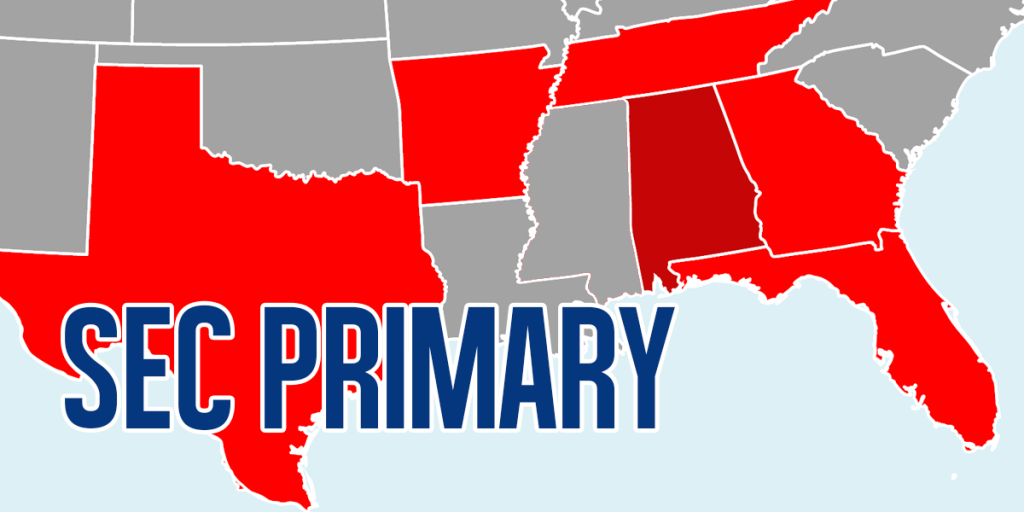
Secretary of State John Merrill, instrumental in creating the SEC Primary, which lumps several Southern states’ primaries together to give a louder voice to Southern voters, celebrated the state’s accomplishments Wednesday. “For the first time in the history of our state, all 67 counties committed to participate in electronic election night reporting,” Merrill said in a news release. “This launch would not have been possible without everyone’s full support and outstanding leadership demonstrated by our Probate Judges and local election officials.” Indeed, just as the polls were closing at 7 p.m. Wednesday, the Secretary’s website began displaying real-time election results. According to Merrill’s statement, there was 100 percent participation in the night’s election reporting. Inclement weather some counties created unexpected delays in reporting, though. However, Merrill’s office deployed necessary staff to help counties ensure accurate results. “1.2 million citizens participated in Alabama’s election March 1,” Merrill said. “This is without a doubt the largest number our state has ever seen in a presidential primary. We attribute this enthusiastic response to the SEC Primary and the excitement that our people have demonstrated as the presidential candidates came to our state and interacted with our people.” All of the major presidential candidates visited the state to campaign, including Tuesday night victors billionaire real estate mogul Donald Trump and former Secretary of State Hillary Clinton. “We look forward to an exciting and engaged General Election in November,” Merrill said. Primary Run-off contests will be held April 12 and the General Election will take place Nov. 8.
How to stop Donald Trump? GOP leaders search for a way

Gripped by chaos and dismay, Republican leaders searched on Wednesday for a last-chance option to derail Donald Trump‘s momentum fueled by seven commanding Super Tuesday victories. Overshadowed by Trump’s wins, Ted Cruz came in a close second in the night’s delegate haul, thanks to a win in his home state of Texas. The strong showing bolstered the senator’s case to be the party’s Trump alternative, even as rival Marco Rubio vowed to continue his fight. The unrelenting division represented the biggest crisis for the GOP in decades, with the party seemingly on track to nominate a presidential candidate it can’t contain. Some party leaders are considering the once-unthinkable option of aligning behind Cruz, whom many dislike, while others are talking of a brokered convention. Some influential outsiders even raise the option of forming a new party. Though convention fights are much more talked about than actually occur, an Associated Press delegate count indicates Trump will have to do better in upcoming contests to claim the nomination before the party’s national gathering in July. So far, he has won 46 percent of the delegates awarded, and he would have to increase that to 52 percent in the remaining primaries. The GOP mayhem contrasts sharply with the increasing cohesion on the Democratic side, where Hillary Clinton locked down solid victories in seven states and was on the path to regaining her status as the inevitable nominee. Clinton’s dominance with black voters carried her to wins across the South. Still, Bernie Sanders picked up wins in his home state of Vermont as well as Minnesota, Oklahoma and Colorado, and he said he would fight on. The Democratic drama paled in comparison to the existential questions Republicans wrestled with in the wake of the most significant election night of the primary. Trump won handily in states as politically opposite as Massachusetts and Alabama, a sign of his broad, outsider appeal and energizing impact on voter turnout. Along with Texas, Cruz took neighboring Oklahoma and also Alaska. Florida Rubio won only liberal Minnesota. Despite Trump’s commanding victories, many Republican leaders remained deeply skeptical he could beat Clinton in a head-to-head matchup in November — and some questioned whether they’d want him in the White House if he did. They turned to the sort of “break glass” options once thought impossible. “Ted Cruz is not my favorite by any means,” Sen. Lindsey Graham, a former candidate whose disdain for his Texas colleague is well known, told CBS News. “But we may be in a position where rallying around Ted Cruz is the only way to stop Donald Trump and I’m not so sure that would work.” Still, Graham also cast doubt on whether elder GOP statesmen could wrest hold of the situation. “At what point do you realize the Republican Party is unorganized — like the Democratic Party? There’s no secret group of people,” he scoffed. The comments came as #NeverTrump hashtag spread across Twitter and an anti-Trump Super Pac released a new online video and said it would increase its daily attacks ahead of primaries on March 8 and March 15. Our Principles PAC latest attack blasts Trump for not clearly repudiating David Duke, a onetime KKK member who endorsed Trump’s campaign. Other prominent Republicans called for more drastic measures. “It may be necessary for men and women of principle within the party to set the self-detonation sequence as they escape the ship to a new party,” wrote conservative blogger Erick Erickson. Erickson was among those calling on the party to coalesce around Cruz. In his victory speech, Trump sent a clear message to the GOP establishment, warning to House Speaker Paul Ryan, who had declared earlier Tuesday that “this party does not prey on people’s prejudices,” that if the two don’t get along, Ryan is “going to have to pay a big price.” Delegate math would seem to underscore the problem for Republicans who reject Trump. For the night, Trump won at least 234 delegates and Cruz won at least 209. Rubio was a distant third with at least 90. There were still 40 delegates left to be allocated. Overall, Trump leads with 316 delegates and Cruz has 226. Rubio has 106, John Kasich has 25 and Ben Carson eight. The math was also tough for Sanders. Clinton was assured of winning at least 457 of the 865 delegates at stake Tuesday. Sanders gained at least 286. When including party leaders, Clinton has at least 1,005 delegates and Sanders has at least 373. It takes 2,383 to win the nomination. Top Sanders advisers argue that Super Tuesday was the best day on the primary calendar for Clinton. But the map will get more difficult for her moving forward, said Sanders senior adviser Tad Devine. Republished with permission of the Associated Press.
Incumbent Richard Shelby easily wins Alabama primary over sea of challengers
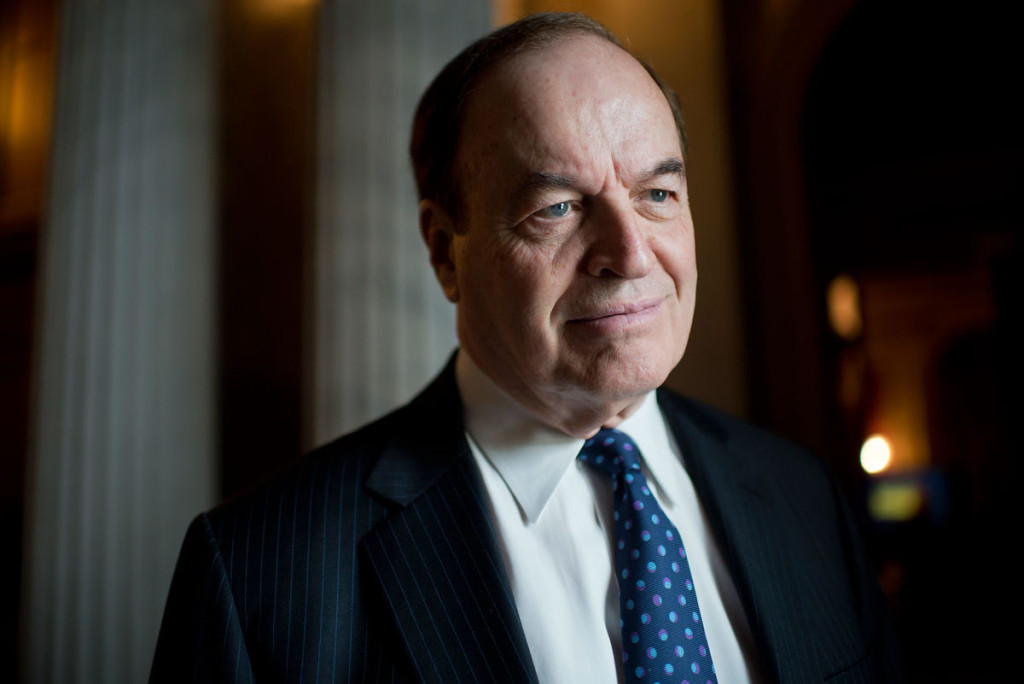
Voters across the Yellowhammer State decisively re-elected Senator Richard Shelby (R-Ala.) to continue as their representative in the U.S. Senate . The race was called with Shelby leading by over 35 points. With 99 percent of Alabama’s precinct’s accounted for, his closest opponent former Marine Capt. Jonathan McConnell garnered only 28 percent of the vote to Shelby’s 65 percent, with all other challengers taking only about 8 percent of the vote. “I am honored that the people of Alabama have once again trusted me to be the Republican nominee for the United States Senate,” said Shelby following his victory. “Serving as your Senator is a privilege and responsibility that I do not take lightly, and I will continue to stand up against big government for all Alabamians and Americans.” Shelby continued, “Tonight’s victory would not be possible without the countless volunteers and supporters who worked to help me advance our conservative message across the state. I am grateful for each and every vote I received today, and I look forward to continuing the conservative fight in the General Election.” Shelby now moves to the General Election on November 8 and will take on Democratic victor Ron Crumpton.
Robert Aderholt wins 4th District primary, looks on to eleventh congressional term
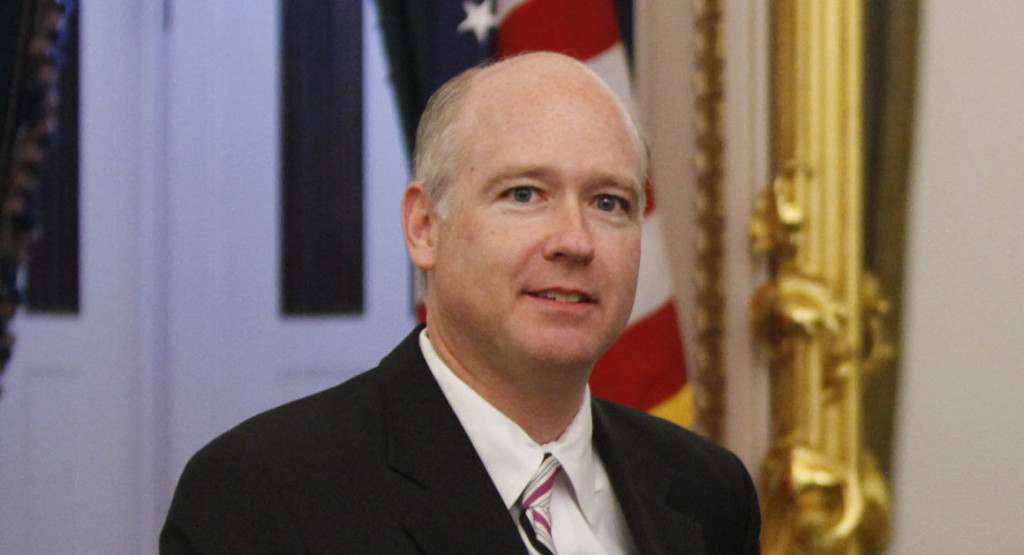
Congressman Robert Aderholt (AL-04) defeated opponent Phil Norris Tuesday night securing the Republican nomination for representative of Alabama’s 4th Congressional District, moving one step closer to his eleventh term in office. According to his spokesperson Carson Clark, Aderholt celebrated his victory with Tuscaloosa County Republicans at Chuck’s Fish in Tuscaloosa. First elected to the U.S. House of Representatives in 1996, Aderholt received 102,348 votes, 81 percent, with 100 percent of precincts reporting. His challenger Norris received 23,343 votes, 18 percent, with 100 percent of precincts reporting. The 4th District includes most of Tuscaloosa, as well as the far northern suburbs of Birmingham and the southern suburbs of Huntsville and Decatur.
In Alabama congressional races, incumbents stay safe
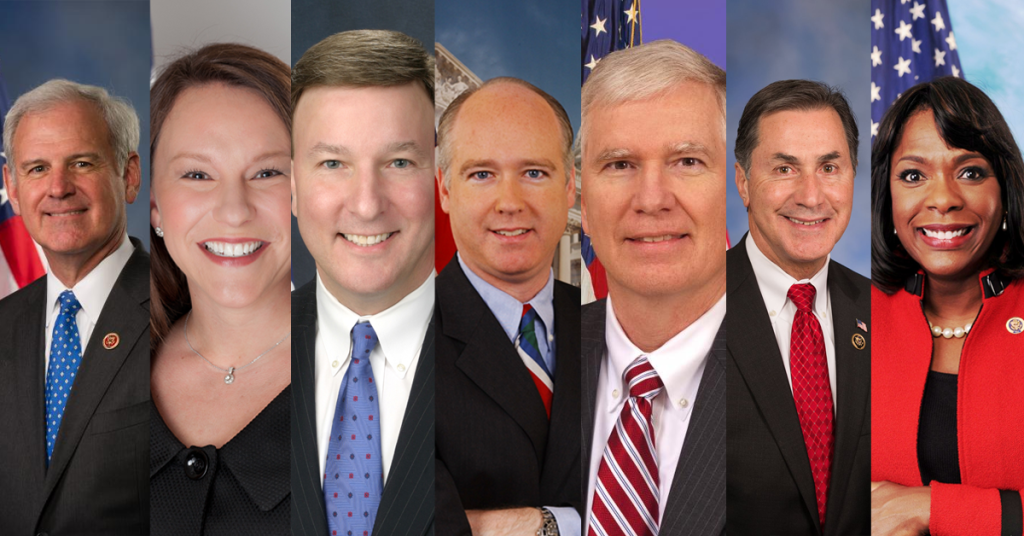
Despite incessant worrying over what Donald Trump-anti-incumbent-fueled voter turnout would mean at the polls, all members of the Alabama congressional delegation managed to hold on to their seats in Tuesday’s primary election. U.S. Senate Republican Richard Shelby, who was first elected to the Senate in 1986, faced challenges from four Republican opponents. With 100 percent of precincts reporting, Shelby won by over 35 points. His closest opponent former Marine Capt. Jonathan McConnell garnered only 28 percent of the vote to Shelby’s 65 percent, with all other challengers taking only about 8 percent of the vote. On the Democratic side, business owner Shadrack McGill, who served in the state Senate from 2010 and 2014, and challengers John Martin, Marcus Bowman and Ron Crumpton faced off also in hopes of unseating Shelby, with Crumpton taking home the Democratic nomination, winning 56 percent of the vote. U.S. House of Representatives AL-01 Former state senator U.S. Rep. Bradley Byrne secured his first full term in office after defeating challenger Dean Young. Byrne, first elected to Congress in a special election in 2013, took home 60 percent of the vote, with 100 percent of precincts reporting. AL-02 Former Montgomery City Council member and three-term Congresswoman, U.S. Rep. Martha Roby defeated Wetumpka Tea Party founder Becky Gerritson to represent the 2nd District, which includes much of Montgomery and southeast Alabama. Roby won slightly more than 66 percent of the vote, meanwhile Gerritson took home only 27 percent of the vote, and Bob Rogers just over 5 percent. AL-03 First elected to the House in 2003, former Calhoun County commissioner U.S. Rep. Mike Rogers defeated longtime Auburn public school administrator Larry DiChiara to represent the 3rd District, which covers east-central Alabama. Rogers won 76 percent of the vote to DiChiara 24 percent. Standing between Rogers and his eighth term in Congress is Jesse Smith. Smith, a Phenix City native, was was unchallenged for the Democratic nomination. AL-04 Congressman Robert Aderholt (AL-04) defeated opponent Phil Norris the Republican nomination for representative of Alabama’s 4th Congressional District, moving one step closer to his eleventh term in office. First elected to the U.S. House of Representatives in 1996, Aderholt received 102,348 votes, 81 percent, with 100 percent of precincts reporting. AL-05 Third term Congressman Rep. Mo Brooks, who represents Alabama’s 5th District — encompassing the counties of Lauderdale, Limestone, Madison, Morgan and most of Jackson — was un-opposed. AL-06 Co-founder and former longtime president of the Alabama Policy Institute, U.S. Congressman Gary Palmer, was un-opposed. Palmer is Alabama’s newest Congressman and first elected in 2014 to represent portions of Birmingham, nearly all of Jefferson County outside of Birmingham, and the entirety of Bibb, Blount, Chilton, Colbert, Coosa and Shelby counties. AL-07 Alabama’s lone Democratic representative, Terri Sewell, who assumed office in 2011 was un-opposed. Her district encompasses portions of Birmingham,Tuscaloosa and Montgomery.
Early polling results indicate big wins for incumbents
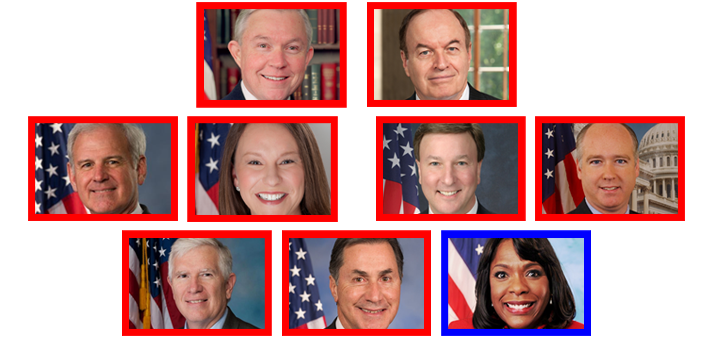
8:15 p.m – With polls having closed just a little over an hour ago, election results from the Secretary of State’s website indicate that incumbents will likely hold on to their seats in the U.S. Senate and House of Representatives. Though only nine of Alabama’s 67 counties are currently reporting, Sen. Richard Shelby is keeping a strangle hold on his seat. Of 6,017 ballots cast thus far, Shelby has collected a dominant 4,248, or 70.6 percent. His closest opposition is newcomer Jonathan McConnell, who has collected 1,294 votes, or 21.5 percent. On the Democratic side, Charles Nana is currently leading Ron Crumpton by more than 14 percentage points. Neither Democrat has made much of a showing leading up to today’s elections, but it had seemed that Crumpton would be leading the race. In much the same fashion, Rep. Martha Roby is leading Wetumpka Tea Party founder Becky Gerritson in the U.S. House District 2 race , with 74.48 percent of the vote compared to Gerritson’s 20.28 percent. Likewise, Reps. Bradley Byrne and Mo Brooks, U.S. House Districts 1 and 3 respectively, are trouncing their opponents by wide margins – in Rogers’ case, nearly 50 percentage points. Rep. Robert Aderholdt is also dominating his opponent with 82 percent of the vote in the U.S. House District 4 race.
Hillary Clinton wins Va. & Ga.; Bernie Sanders wins Vermont
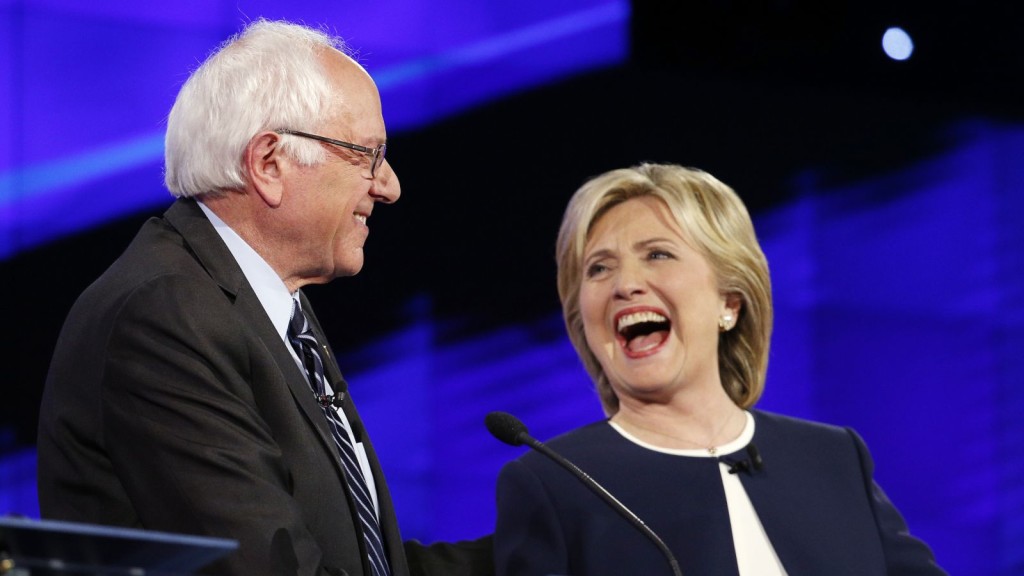
Hillary Clinton wins the Democratic presidential primaries in Virginia and Georgia, while Bernie Sanders wins in his home state of Vermont. According to early results of the exit poll conducted by Edison Research for the Associated Press and Television Networks, Clinton led in both Virginia and Georgia among both men and women. Sanders led among voters under 30 and Clinton held a commanding lead among those 45 and over. In Vermont, Bernie Sanders was supported by overwhelming majorities of both men and women, and huge majorities of voters across all age groups. Half of Vermont Democrats said they want the next president’s policies to be more liberal than those of President Barack Obama. Republished with permission from the Associated Press.
Where will Alabama candidates be Election night?

Super Tuesday — or what the south is affectionately referring to as the SEC Primary — could all but solidify the 2016 presidential race as election results from 12 states, including Alabama, roll in Tuesday night. In the Yellowhammer State, incumbent U.S. Sen. Richard Shelby is hoping to win once again his Party’s nomination, over a slew of challengers, most noticeably former Marine Jonathan McConnell. Meanwhile, all of Alabama’s House Members face challengers. Here is where the candidates will wait for the results: The incumbents: U.S. Sen. Richard Shelby What: Election Night Watch Party Where: Embassy Suites Hotel, 2410 University Blvd. Tuscaloosa When: 6:30 p.m. CST U.S. Rep. Bradley Byrne (AL-01): What: Bradley Byrne Election Night Watch Party Where: Moe’s Original BBQ, 701 Spring Hill Ave., Mobile When: 7 p.m. CT U.S. Rep. Martha Roby (AL-02): What: Election night reception Where: The Warehouse at Alley Station; 103 Commerce St; Montgomery When: 7 p.m., CT Extra details: Roby is tentatively scheduled to speak about 30 minutes after the race is called. U.S. Rep. Mike Rogers (AL-03): When: Post-Election Party Where: The Green Olive; 1024 Noble St; Anniston, AL 36201 U.S. Rep. Robert Aderholt (AL-04): What: Tuscaloosa County Republicans Election Night Watch Party Where: Chuck’s Fish; 508 Greensboro Ave; Tuscaloosa, AL 35401 The challengers: Jonathan McConnell for U.S. Senate What: Election Night Results Watching Party Where: Cahaba Brewing Co., 4500 Fifth Ave. S., Birmingham When: 7:30 p.m. CT Becky Gerritson for AL-02 What: Election Night Watch Party Where: Coaches Corner Sports Bar and Grill, 203 Orline St., Wetumpka This story will be updated as more details from other candidates come in.
Martha Roby overwhelmingly wins in key re-election bid
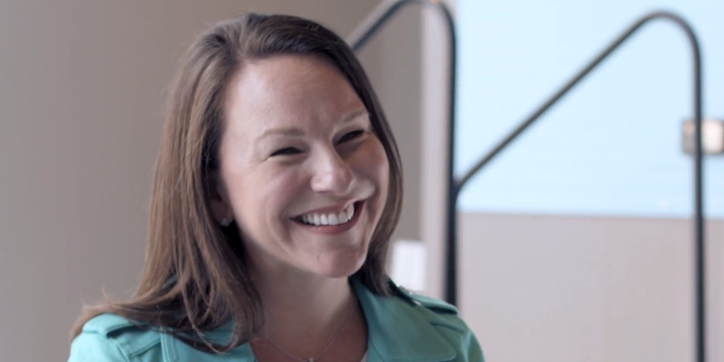
Voters across Alabama’s 2nd Congressional District overwhelmingly supported U.S. Rep. Martha Roby in her re-election bid on Tuesday over her opponent, Wetumpka Tea Party founder, Becky Gerriston by nearly 40 percent. Official results Tuesday night indicated Roby won slightly more than 66 percent of the vote in the 2nd District, which represents Autauga, Barbour, Bullock, Butler, Coffee, Conecuh, Covington, Crenshaw, Dale, Elmore, Geneva, Henry, Houston, Pike, and parts of Montgomery counties. Gerritson took home only 27 percent of the vote, and Bob Rogers just over 5 percent. Following her victory, Roby thanked the voters for their trust and support, saying the strong win showed voters were choosing “solutions over sanctimony, progress over pessimism, and results over rage.” “Today, Alabama voters have honored me – not just with their vote – but with their blessing and with a mandate to fight for conservative solutions,” Roby said to a crowded room of supporters Tuesday night. “This win matters because it sends a message about who we are going to be as a party in Alabama and what being a conservative means here today. I’m a conservative who wants to solve problems, not cause problems for conservatives.”
Donald Trump leads GOP field with 40 percent support in new poll
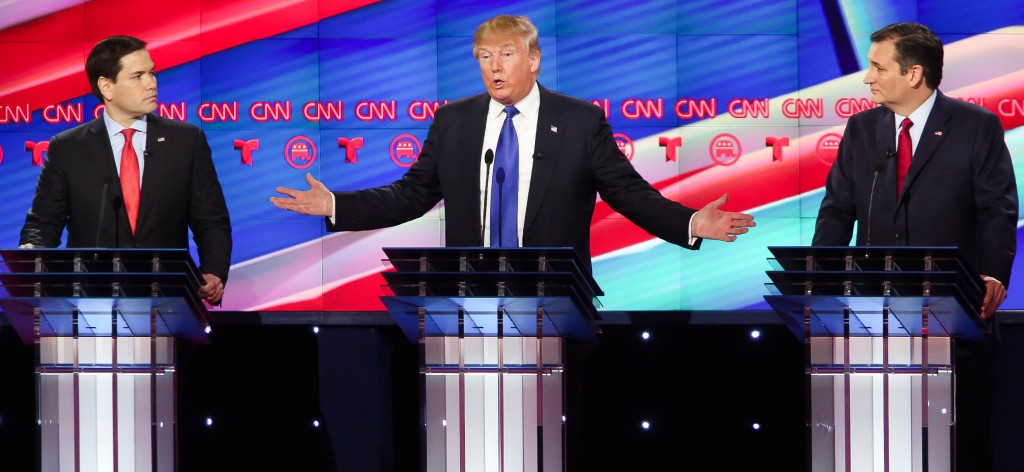
More than 70 percent of Republicans said they believe Donald Trump will be their party’s nominee. According to an NBC News|SurveyMonkey Weekly Election Tracking Poll, 71 percent of registered Republicans said Trump will win the Republican nomination. That’s up 15 percent from just one week earlier. Trump leads the GOP pack with 40 percent support, followed by Marco Rubio at 21 percent. Ted Cruz is in third with 18 percent. According to the survey, 47 percent of Republicans said they are absolutely certain they will vote for their top choice; while 16 percent said was a 50-50 chance they would vote for their top choice. In a two-man race, Trump defeats Rubio 52-percent to 46 percent. The survey found Trump beats Cruz, 55-percent to 42-percent. On the Democratic side, Hillary Clinton leads Bernie Sanders, 51 percent to 41 percent. The NBC News|SurveyMonkey online tracking poll was conducted from Feb. 22 through February 28.


